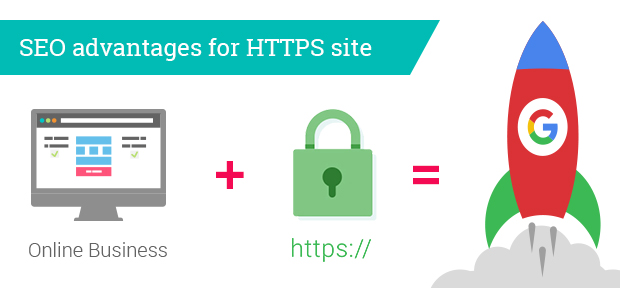SSL can help your search rankings in a variety of ways
You already know that you need to have an SSL certificate for security purposes, but did you know that SSL also improves SEO?
It’s true.
Just installing SSL can give you a boost, but SSL is also a requirement for other optimizations like Accelerated Mobile Pages and HTTP/2.
Let’s take a closer look.

HTTPS is a Search Ranking Signal
When you purchase an SSL certificate, it’s important that you configure your entire website for HTTPS as opposed to just the areas that require it for data security purposes. There are a couple of reasons for this, not the least of which is that it helps with user privacy by blocking third parties from seeing what pages they’re viewing. But for the sake of this conversation, serving your entire website over HTTPS also improves your SEO too.
Back in 2014, Google announced that it was adding HTTPS as a ranking signal. Since then the prominence of that signal has only increased as the web giant has pushed for universal encryption. Some experts estimate the signal can provide up to a 5% boost.
But only the pages served over HTTPS get credit. And not just the page, but any assets or third-party platforms associated with the page need to be served over HTTPS as well.
Initiate a secure HTTPS connection and see your website in action
With SSL renewals, increase your search engine ranking along with enhanced security features.
Other Optimizations that Require SSL
In addition to providing a boost just for being installed properly, SSL also enables you to optimize your search ranking potential in other ways too. As you well known, at this point Google is not looking for pages with lots of keywords stuffed into it or millions of back-links to it – those are important, but they aren’t what makes or breaks SEO anymore – what Google wants is a page that returns the most helpful, relevant result for specific search queries made on mobile phones.
That means a huge part of SEO nowadays is mobile performance. Enter Accelerated Mobile Pages (AMP). Did you know that you can’t make pages AMP-ready if they’re not encrypted?
You have to have SSL to take advantage of AMP.
The same can be said for HTTP/2. Once again, performance is a major ranking factor and HTTP/2, the successor to HTTP, offers vastly improved performance over its predecessor.
But you need SSL.
Let’s Wrap This Up
There’s not a whole lot more to say. In 2017, the browser community has stopped asking and is now more-or-less requiring that websites use SSL. They’re adding negative indicators and penalizing where they can in an effort to get the web to encrypt.
But beyond the security aspects and browser compliance, SSL can be a boon to SEO. And as more time passes and more and more sites adopt SSL, the pendulum will eventually swing the other direction to where not having SSL will become a competitive disadvantage.
To migrate to HTTPS now, leverage the SEO benefits of SSL while they’re still that benefits.









 (12 votes, average: 4.42 out of 5, rated)
(12 votes, average: 4.42 out of 5, rated)